
The map is a butterfly of the family Nymphalidae.
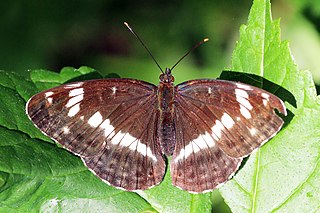
Limenitis camilla, the (Eurasian) white admiral, is a butterfly of the family Nymphalidae. It is found in woodland throughout southern Britain and much of Europe and the Palearctic, extending as far east as Japan.

Erebia epistygne, the spring ringlet, is a species of butterfly in the family Nymphalidae. It is found in France and Spain. Its natural habitat is temperate grassland.
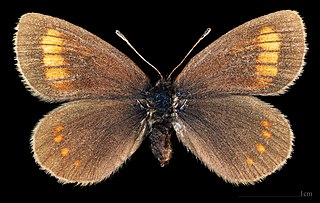
Erebia pharte, the blind ringlet, is a butterfly of the family Nymphalidae. It is an Alpine butterfly.
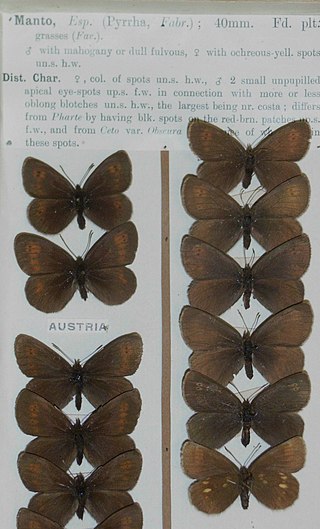
The yellow-spotted ringlet is a member of the subfamily Satyrinae of the family Nymphalidae. It is associated with (sub)alpine meadows at 900–2,500 m above sea level. It is found in the Alps, the Pyrenees, the Cantabrian Mountains, the Massif Central, the Vosges Mountains, the Carpathian Mountains and the mountains of Herzegovina.
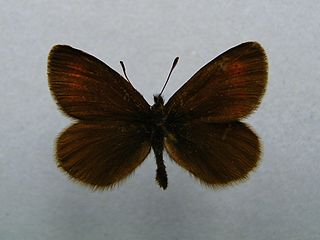
The Eriphyle ringlet is a member of the subfamily Satyrinae of family Nymphalidae. It is a high mountain butterfly found in the Alps.Wheeler (1903) gives a short description

The Styrian ringlet is a member of the subfamily Satyrinae of the family Nymphalidae. It is a mountain butterfly found in the Austrian and Italian Alps, Croatia and Slovenia.
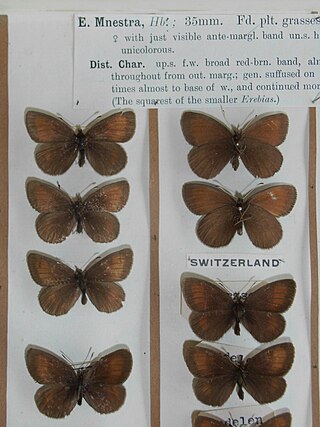
Mnestra's ringlet is a member of the subfamily Satyrinae of the family Nymphalidae. It is a mountain butterfly found in the Alps of Austria, France, Italy and Switzerland. The Mnestra's ringlet is named for Mnestra, a daughter of Erysichthon, king of Thessaly in Greek mythology.

The water ringlet is a member of the subfamily Satyrinae of family Nymphalidae. It is a high altitude butterfly found in the Alps, Bavaria, Styria, Pyrenees, Carpathians and Bulgaria.

Setina irrorella, the dew moth, is a moth of the family Erebidae. The species was first described by Carl Linnaeus in his 1758 10th edition of Systema Naturae. It is found in the Palearctic from Ireland, then through Europe and east to northern and central Asia to the Pacific Ocean. It is missing in the high north and parts of the Mediterranean region. It is found also in the limestone Alps up to 2,000 meters above sea level.

Boloria dia, the Weaver's fritillary or violet fritillary, is a butterfly in the family Nymphalidae. The name Weaver's fritillary is in honor of Richard Weaver, an English insect collector who claimed to have obtained the specimen within ten miles of Birmingham around 1820. However, B. dia is very rare in England and the few specimens known from there are thought to be from possibly accidental introductions.

Catocala sponsa, the dark crimson underwing, is a species of moth of the family Erebidae. It is found in Europe, North Africa and from Anatolia up to the Caucasus.

Agrochola helvola, the flounced chestnut, is a moth of the family Noctuidae. It was first described by Carl Linnaeus in his landmark 1758 10th edition of Systema Naturae. The species is found in most of Europe, north to Scotland and Fennoscandia up to the Arctic Circle, south to Spain, Sicily, Greece further east to the Middle East, Armenia, Asia Minor, western Turkestan and central Asia up to central Siberia.

Erebia melampus, the lesser mountain ringlet, is a member of the subfamily Satyrinae of the family Nymphalidae.
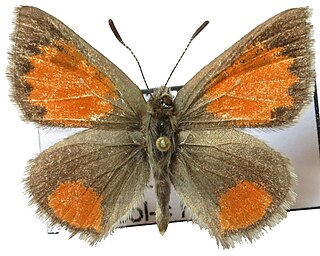
Tomares callimachus, the Caucasian vernal copper, is a butterfly of the family Lycaenidae. It is found in Anatolia, Iraq, Iran, the Caucasus, and Transcaucasia.
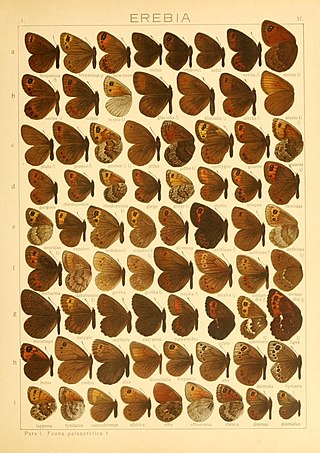
Erebia dabanensis is a small butterfly found in the East Palearctic that belongs to the browns family.

Erebia maurisius is a butterfly found in the East Palearctic that belongs to the browns family.

Neolysandra coelestina is a butterfly found in the Palearctic that belongs to the blues family.

Aldania themis is a butterfly found in the East Palearctic that belongs to the browns family.

Araschnia davidis is a butterfly found in the Palearctic that belongs to the browns family. It is endemic to Tibet, West and Central China.




















